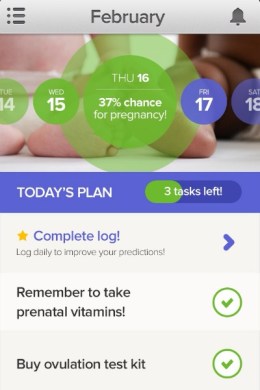
Max Levchin co-founded PayPal, a company that changed the world, or at least the part of it that involves paying for stuff online. He also started Slide — the now-defunct social-networking company whose best-known product was a game that involved throwing sheep — and is the chairman of Yelp.
His latest enterprise is ambitious in multiple ways his previous ones were not. It wants to help couples who are trying to conceive babies — both scientifically and financially — as the first step in a grand plan to change how people pay for healthcare.
The company in question, Glow, was announced in May at the D conference and is launching a free iPhone app by the same name today in Apple‘s iOS App Store. (An Android version is in the works.) It’s the first product being spun out of HVF, a company Levchin started to create projects relating to innovative use of big data. I visited Glow for a demo and spoke with Mike Huang, its CEO.
Glow has “his” and “her” modes and collects information concerning factors such as menstrual cycles, cervical mucus and physical and emotional states. (At the moment, all the data it collects concerns the woman who hopes to get pregnant; the company plans to add factors relating to the male in the equation as well.) The app provides advice about how to maximize the chances of pregnancy, going beyond the technical issues to involve features like the ability to order flowers or make a reservation for a nice dinner.
Why add flowers and dinner into the mix? Huang told me that Glow’s creators tried hard to make it feel approachable rather than clinical. “The whole topic, getting pregnant, is somewhat taboo. Growing up, I learned more about not getting pregnant.”
Glow’s recommendations about when to try having a baby and other related matters — it’ll advise you to see a doctor if it thinks a medical condition is hurting your chances — are based on both advice from medical consultants and anonymized, aggregated data it collects from all Glow users. (At first, it’ll rely on data from a couple of hundred beta testers — and yes, some of them have gotten pregnant.) The more users the app gets, the more effective its advice should be. Huang told me that the goal is to double the chances of pregnancy.
The app competes with scads of more straightforward, less ambitious iPhone fertility trackers, as well as Ovuline, another one that attempts to help through the use of collected data from users.
Of course, some couples will have trouble conceiving no matter how good their timing is. So the company is also offering Glow First, an optional plan — Huang called it a “Christmas Club for babies” — to help pay for fertility treatments.
Glow users can choose to contribute $50 a month for up to 10 months to the fund. If they get pregnant during that time, they don’t get their money back. If they don’t, they get a share of the pooled money to use for fertility treatments. Huang says that the company hopes that Glow First will be able to cover the entire cost for such procedures, which can run from $20,000 to $40,000.
The company isn’t taking any of the Glow First money for itself, and Levchin is kicking in $1 million to get it started.
If the Glow First idea sounds a little like insurance…well, that’s because it sounds a little like insurance. Huang emphasized that it isn’t insurance, and that Glow in its current form isn’t an insurance company. However, its plans for becoming a money-making enterprise involve offering real insurance of some sort in the future. “We want to be the first insurance company that everybody loves,” Huang says.
Huang told me that Glow’s future also involves devices that could collect pertinent data without users having to enter it in, and medical issues beyond pregnancy. “Anything considered elective by insurance companies, we’re interested in.”
It’s all wildly ambitious, but the first goal is to show that Glow does what it’s supposed to do. “Within 18 months or less, we should have a good idea of whether we’re on the right track or not,” Huang says. And for this app, the ultimate metrics of success won’t involve downloads or active users: the bottom line will be measurable in babies.


